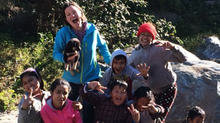The Chaos and Beauty of Nepal
- Nov 29, 2021
- 3 min read
The Chaos & Beauty of Nepal
Arriving in Kathmandu was more of a shock than expected. The culture is unlike any I’ve experienced. I’ve been contemplating the idea that Nepal is a place of contradictions. There is great poverty but great kindness. There is beauty yet grave pollution. The markets bost fresh foods while many are eating fried foods with poorly processed oils. There is chaos in the streets. People bathe and wash clothes from designated water pipes while others live in lavish apartments. With no street lights, walking across the street becomes an art form. A balance between confidence and fear.
Within the chaos is a natural order. A relationship closer to nature then back at home. People live closer to the dust and dirt. They go home with the sun and wake early. There is a “live in the present” feel that will drive a westerner crazy. It’s okay to be late. Plans are made for now, not a week from now. This is how one realizes the benefit of experiencing other cultures. I come from a culture of order, where order is praised and expected. Yet, I see a lot of unnecessary stress in the order of our Western life. It turns into sacrifice beyond what is healthy. Here family is what matters. Reflecting on both ways of life, can give one more options in regards to what is the correct way to live. Taking what pieces resonate for a more balanced view of the world. While goals and hard work are necessary, it is only human to be late. Here one can see the benefit in taking life slower, breathing in the present moment.
Waking up in Kathmandu, wakes up the senses. I live near Bouhda where the famous Bouhda Stupa is located. It’s a Buddhist temple, and many Buddhists live nearby. I wake around 5:30am and begin my meditation. While meditating I hear chatting, drumbing, and chimes. I smell incense and the unfortunate smell of burning plastic. After meditating, I exercise on the roof, cook some breakfast, and head to work.
Work is located twenty minutes from my apartment. This truly requires one to be awake and aware. There are holes in the street, dog and cow feces, hanging electrical hire, and many other stimulating and strange sights. While there is much pollution, one also smells fresh masala being heated and ground into powder. There are endless honks and the unexpected skooter rushing past to make the gap between you and the curb. No texting and walking here!
I arrive at work and there is a line of patients waiting. I work with an amazing and beautiful woman named Tsering. She is my interpreter and also a trained acupuncturist. The first busy days were chaotic. Now, we have a rhythm. Tsering does the intake and I fill in towards the end to ask additional questions and take the pulse. We see 20-25 patients a day. Most patients are coming in for pain. Others have digestive issues, insomnia, and other internal organ dysfunction that would usually be treated by medical doctors in the States. The medical system is similar to the United States in that it is insanely expensive for those without money to access it. Besides that, the health care here is poor. Many patients say their medical doctor doesn't know what to do with them, so here they are. Not entirely different from acupuncturist’s clientele in the USA, but the severity of these cases are higher, providing interesting experience and responsibility for the wellbeing of these patients.
I work six days a week. On my day off I do laundry, go shopping for groceries, review patient charts, and cook a meal. The food here is spectacular. Many things I’ve never heard of. Nepali people are creative cooks, and it shows from the many variations of vegetables, dals, and chutneys. I’ve been using a local Nepali cook book and I’ll try a new recipe a week. Cabbage Nepali style, pumpkin curry, yellow dal, paratha, tomato & cucumber salad with cumin seeds! This is paradise for those inspired by food.
To those back home who support me, I’m eternally grateful. You have sent me away to help others and in the process you have helped me grow. You’ve given me the opportunity to challenge my ability to adjust to a culture so unlike our own. With this experience, I know giving has to continue within my future practice. To continue the gift of giving, first given to me by those who believed in sharing their wealth for the health and wellbeing of those less fortunate.










































Comments